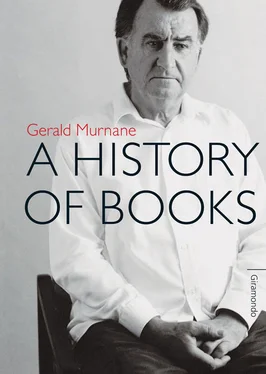The man, whatever his name was, remembered perhaps fifteen years afterwards only a summary of the advice that he had given to the young woman, whatever her name was, after she had reported to him what was summarised in the previous paragraph. The man remembered that he had told the young woman that he would never advise any person to give up the opportunity to follow some or another career or profession so that the person might write fiction; that she ought to go back to Tasmania and to become a partner in the establishing of the new restaurant; but that she ought to write during the next few months a piece of fiction. If she wrote such a piece of fiction, so the man told the young woman, and if she sent the fiction to him during the next few months, he would read it at once and would tell her soon afterwards in writing whether or not he had been impressed by the fiction. If it happened that he had been deeply impressed, so the man said, then she might with good reason apply to enrol in his writing course.
During the months following the cold and cloudy afternoon mentioned above, the man would sometimes note, while he was opening his mail in his office of a morning, that none of the envelopes seemed likely to have been sent from Tasmania and to contain the typescript of a piece of fiction. During the years following the afternoon mentioned, the man would sometimes recall one or another moment from the afternoon.
The man had never been able to recall clearly the appearance of any person. What he recalled were what he called details connected with the presence of the person. What he recalled in connection with the young woman who had visited him from Tasmania was the earnest tone of her voice and the paleness of her complexion and a wound on her wrist that he had found himself often staring at during their interview. Down the side of her pale left wrist was a long mark made, he supposed, by a knife that had slipped while she worked as a chef. A scab had formed over the wound, but a narrow zone of red remained around the scab.
During the years when he was a teacher of fiction writing, the man of this fiction had read aloud to his students and had urged them to consider many hundreds of statements by writers of fiction or anecdotes about those writers. In the years after he had ceased to be a teacher of fiction writing the man had forgotten most of those statements and anecdotes, but he sometimes remembered having told one or another class that the writer Flaubert had claimed, or was reported as having claimed, that he could hear the rhythms of his still-unwritten sentences for pages ahead. Whenever the man had told this to a class, he had hoped to cause his students to reflect on the power of the sentence over the mind of a certain sort of writer; but he, the man, had often supposed that the claim, or the reported claim, by Flaubert was much exaggerated. Then, about five years after he had ceased to be a teacher of fiction writing, and while he was watching in his mind the last part of what he sometimes called the Gold Cup of Remembered Fiction, he recognised that a previously unthought-of contender in that race was a sentence as yet unwritten.
If the man had had an ear for sentences as acute as Flaubert had had, or was supposed to have had, he, the man, might have heard in his mind the rhythm of the sentence mentioned above long before it had joined in with the other contenders in the race in his mind. But the man could hardly claim that he heard the rhythm of the unwritten sentence in his mind even while he was aware of the sentence as a late contender in the race. What the man might have claimed instead was that he was aware of what he might have called details connected with the meaning of the sentence. While the still unwritten sentence seemed about to claim the leaders, as a racing commentator might have said, the man in whose mind the race was being run was still unaware of the meaning of the unwritten sentence. But the man was aware that the meaning would be connected with the greenness of the island of Tasmania in his mind, with the white and the red of skin marked by a knife in his mind, and with a person in his mind who had not written any fiction or who had begun long ago to write a piece of fiction but had since left off writing.
My Dearest Niece
With this letter, our long-standing correspondence comes to an end. The reasons for this will become clear while you read the following pages. Yes, this letter must be my last, and yet I begin it with the same message that I sent in all my earlier letters. I remind you yet again, dear niece, that you are not obliged to reply to me; and I add yet again that I almost prefer not to hear from you, since this allows me to imagine many possible replies.
This letter has been the hardest to compose. In all my earlier letters I wrote the truth, but in these pages I have to write what might be called a higher truth. First, however, I must set the scene for you, as usual.
The time is evening, and the sky is almost dark. The day was fine and calm, and the stars will all be visible shortly, but the ocean is strangely loud. The weather must be bad far away in the west, because a heavy swell is running and I can hear, every half-minute, the loud crack as some huge wave breaks against the cliffs. After each crack, I imagine I feel under my feet the same tremor that I would feel if I were standing on one of the cliffs; but of course the cliffs are nearly a kilometre away, and the old farmhouse stands rock-solid as always.
As a child and a young man, I was known as the reader of the family. While my brothers and sisters were playing cards or listening to the gramophone, I would be sitting in a corner with a book open in front of me. I was always lost in a book, so my mother used to say. She, the wife of a dairy farmer and the mother of seven children, had little opportunity to read, but that simple remark of hers stays in my thoughts as I write this last letter. What did my mother understand of body, mind, soul, that caused her to report of her eldest son, while his body and face and eyes were clearly in her sight, that he was somehow within the confines of the smallish object held in his hands and, moreover, unsure of his whereabouts?
Something else my mother said of me: I was a bookish person. After you have read this letter, niece, you may choose to understand my mother’s remark in other than its obvious sense. My mother would have meant that I read a great many books, but she was, in fact, wrong. If my hard-worked mother had cared to look closely, she might sometimes have seen that the book I held up to the kerosene lamp at the kitchen table on some evening in winter was the same that I had shielded with my hand from the sunlight on the back veranda on some Sunday morning of the previous summer.
When I write ‘book’, I mean, as you surely know, the sort of book that has characters, a setting, and a story. I have seldom troubled myself over any other sort of book.
In many a letter during past years, I named for you one or another book that had affected me. As well, I mentioned certain passages in each book and told you that I often took pains to recall my first reading of each passage. I wonder how much you divined of what I am now about to tell you in full. The truth is, dear niece, that I have been, from an early age, powerfully drawn towards certain female characters in books. I am almost reluctant, even in such a letter as this, to write in everyday language about my feelings towards these personages, but you might begin to understand my situation if you think of me as having fallen, and ever since remained, in love with the personages.
Picture me on the day when I first learned what it was that would inspire and sustain me from then onwards. I am hardly more than a child. I am sitting on the lowest of the tier of sandstone blocks that support the rainwater tank on the shady, southern side of the house. This is my favourite place for reading by day in mild weather. The bulk of the tank-stand protects me from the sea wind, and if I lean sideways I sometimes feel against my face a trailing leaf or petal from the nasturtiums that grow out of the cracks between the topmost stones and down over the cream-coloured surface behind me. I am reading a book by an Englishman who died nearly fifty years before my birth. The book was presented to me as suitable for older children, but I was to learn much later that the author intended the book for adults. The action of the book purported to have taken place nearly a thousand years before the author’s birth. Among the major characters of the book was a young woman who later became the wife of the chief character and, later again, was rejected by him. At one or another moment while I was reading from the later pages of the book a report of the circumstances of this female character, I had to stop reading. Rather than cause embarrassment to either of us, I will describe my situation at that moment by calling on one of those stock expressions that can yield surprising meaning if one ponders them word by word. I tell you, dear niece, that my feelings got the better of me for a few moments.
Читать дальше












